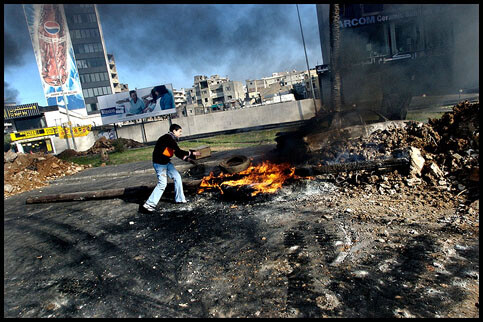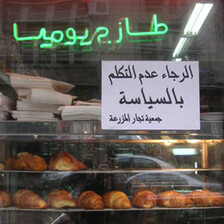The Daily Star 24 January 2007

A Lebanese youth participating in the opposition demonstrations. (Photo: Paul)
BEIRUT: Lebanon’s army - backed by police forces - tried Tuesday to stamp out violence erupting from street protests, only to see it resume again in area after area. By the time The Daily Star went to press, at least three people had died and 133 others, including eight policemen, were wounded in clashes.
Hotspots for Tuesday’s clashes included Jounieh, Batroun, Chekka, Koura, Akkar and Tripoli in Northern Lebanon; Dekkwaneh, Nahr al-Mott and Jdeideh in Mount Lebanon; and Corniche al-Mazraa and Tariq al-Jdideh in Beirut.
An Internal Security Forces (ISF) official told The Daily Star that he feared violence in Tripoli and Chekka could worsen overnight. The ISF official did not wish to be identified, as he was not authorized to speak to the media.
“In the North protesters are using knives and guns,” said one Emergency Medical Services source. “In the North every house has weapons and has easier access to them than in Beirut. In Beirut bottles and sticks are mostly used in clashes.”
Using bulldozers to scatter protesters, the army reopened Nahr al-Mott in the afternoon, after it was blockaded by demonstrators in the morning. Troops were deployed along Kesrouan’s highway to ensure it remained open to traffic.
Despite repeated attempts to quell violence, clashes continued erupting in Tripoli and Chekka in the North. Violence between Hizbullah and Future Movement supporters killed at least two people in Tripoli. Supporters of the Lebanese Forces and the Free Patriotic Movement clashed in Chekka, leaving many wounded.
“ISF units are monitoring the roads,” said the ISF official. “About 21,000 forces - army and police - are present throughout Lebanon.”
Sources at EMS predicted that tensions in Corniche al-Mazraa could reignite. The area was the scene of intense clashes throughout the day, despite a large army presence.
Security in Downtown Beirut was beefed up to 1,000 army personnel, according to a sergeant stationed there who wished to remain anonymous.
All thoroughfares to the Parliament were blocked with two rows of cement blocks buttressing two meters of barbed wire.
“Security is nil,” said Nader al-Fata, an employee at Bank of Beirut’s Downtown branch. “In Downtown it’s a bit safer as the Lebanese security forces are here.” Most banks in the Downtown area were open.
The Banque du Liban in Hamra had 20 troops on hand to “resist any attempt at looting,” said one soldier, who declined to give his name as he was not authorized to comment.
Maria Abi-Habib is a Lebanese journalist writing from Beirut. This article originally appeared in Lebanon’s Daily Star and is republished with the author’s permission.
Related Links



